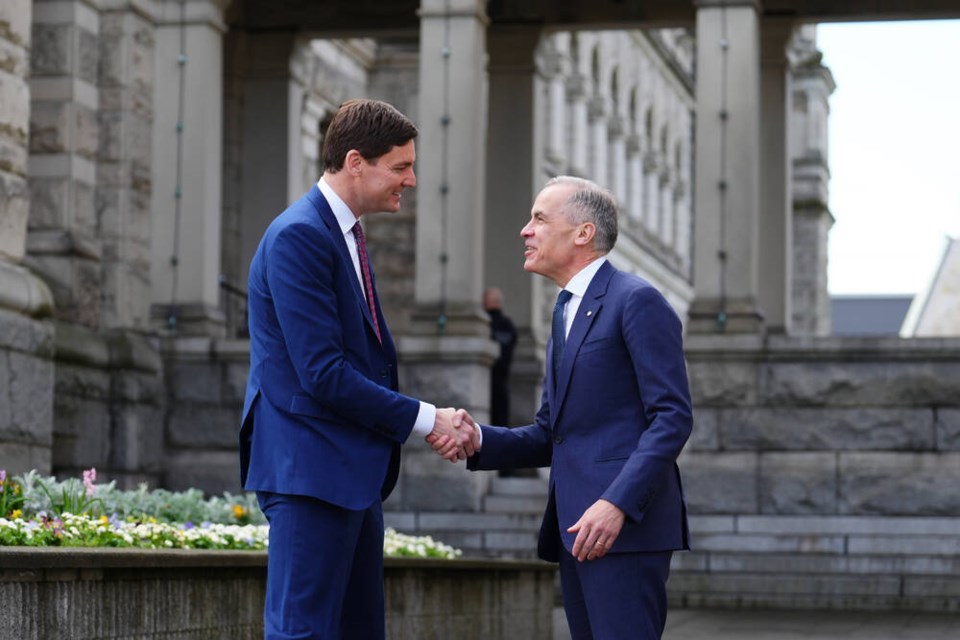Prime Minister Mark Carney started his day in Victoria on Monday talking about national parks and protected areas, but when he got to Premier David Eby’s office, the topic changed to protecting forest workers’ jobs.
The industry took another body blow Friday when the U.S. served notice that a countervailing duty on most softwood lumber will jump to 34.45 per cent from 14.4 per cent in coming months.
B.C. officials made it clear they are keenly interested in seeing the province get the same federal attention the auto industry (read: Ontario) will be getting in terms of emergency response.
For all the patriotic talk about the Team Canada approach, the federal government has to stay as even-handed as possible during the tariff war to keep the team together.
B.C. officials made it clear they think Ottawa is coming up short.
Eby signalled before the brief private meeting with Carney that the latest punitive U.S. trade measure was going to be top of mind.
He said after the meeting that the “renewed assault on our forestry sector needs the same Team Canada response as the manufacturing and auto industry jobs in Ontario and Quebec.”
Eby issued a statement saying Carney confirmed his understanding of the seriousness of the issue and was committed to addressing it proactively.
“The Team Canada approach is one B.C. supports, and it is our expectation other provinces will support us, too.”
The countervail duty is supposed to be a penalty imposed after elaborate technical calculations about subsidies and market prices, but Forests Minister Ravi Parmar said Trump is using his commerce secretary to launch a political attack.
Arguments over softwood duties have raged for more than 40 years, with six major skirmishes over the Canadian share of the U.S. lumber market.
The NDP is in the middle of a pivot on forest policy. After years where the focus was more on protecting forests than exploiting them, numerous initiatives are underway to salvage what’s left of the industry, which has been bleeding jobs for years.
The Council of Forest Industries released a report last week calculating a 6.5 per cent annual drop in the harvest from 2013 and 2023.
Job loss is widely expected to hit catastrophic levels with the additional duties. Even more duties are expected in coming weeks and they may apply to all wood products, not just softwood.
“It’s clear to us that the federal government has to step up as well,” Parmar said. “They have been absent on the file.”
He said B.C. efforts to get a federal loan guarantee program have not yet been addressed, and the federal government cut funding earlier for trade diversification, which is now a critical priority for the forest industry.
Carney told reporters prior to the meeting that his main concern is the 50,000 workers who will be affected.
“I am very focused on the issue. Premier Eby and I will be discussing specific measures that can be taken. We have made it very clear that we will act.”
Carney said the response will include “specific steps to protect those workers.”
He cited his housing strategy promise of last week to double the rate of new homes built with an emphasis on using Canadian lumber.
“It takes time and it won’t fully replace the U.S. market.”
Carney said a series of projects involving accelerating infrastructure spending in the national interest “at this time of crisis” lie ahead.
Opposition Leader John Rustad said neither Eby nor Carney are doing enough to help the forest industry. Rustad, who served briefly as forest minister in 2017, said the amount of wood cut last year is down two-thirds from when the NDP took over eight years ago.
“We are by far the most expensive jurisdiction in North America, if not the world. You can’t compete when you’re in that situation.”
While B.C. and Ottawa work on coping with the looming 34.45 per cent duty, the big emphasis on actually fighting it looks to be waiting for the retail impact to hit U.S. retail stores, where price hikes are expected, which could trigger a backlash.
Just So You Know: The Conservative Party of B.C. House Leader is Áʼa:líya Warbus, not Peter Milobar as stated here Saturday. My apologies.
>>> To comment on this article, write a letter to the editor: [email protected]



